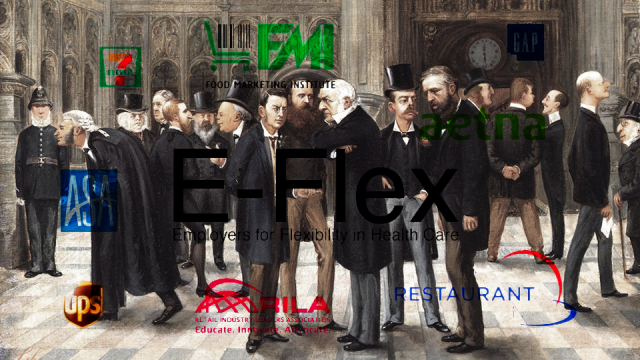
When the Affordable Care Act required that “large employers” offer health care coverage to workers, businesses reliant on part-time, temporary and seasonal workers in the staffing, construction, retail and service industries sought a way to loosen those obligations.
Enter the “Employers for Flexibility in Health Care Coalition,” a working group with a name that suggests it brings solutions to the complicated health care law. E-Flex, as it is often called, says on its web page that it is “working to help ensure that employer-sponsored coverage — the backbone of the U.S. health care system — remains a competitive and affordable option for employers and for employees.”
E-Flex’s name regularly appears in testimony and letters to Congress and in comments filed with federal regulators. But the coalition has no office space or business registration in Washington, D.C.
So who or what is E-Flex? It is two dozen trade groups and corporations that came together in an effort to convince the government to reduce employers’ health insurance obligations and narrow workers’ eligibility for employer-sponsored health coverage.
E-Flex dramatically increased spending on lobbying last year, to $460,000, compared with $300,000 in 2012, a 53 percent jump. The increase in activity is no doubt tied to the continuing debate over employer-mandated coverage. Last week, President Barack Obama announced he would delay the coverage mandate for medium-sized employers until 2016.
Coalitions like E-Flex don’t usually publicize how much members pay or how they operate. But a Center for Public Integrity review of voluntary corporate disclosures, lobbying records and interviews with coalition members and experts in the industry sheds new light on these vaguely named, largely unknown, yet highly influential organizations.
For its part, E-Flex is led by the Retail Industry Leaders Association.
Christine Pollack, the vice president of government affairs at the retail group and chair of E-Flex said the coalition was created by an executive committee of trade associations and a health insurance giant to “coalesce on a common thread” of problems presented by inconsistent workforce hours.
Founding members had bumped into one another for years on Capitol Hill, said Edward Lenz, an attorney for the American Staffing Association, and in some cases, maintained relationships with the same lobbying firm — the D.C. arm of Ernst & Young.
All members, including UPS, 7-Eleven and the National Association of Home Builders, make financial contributions to E-Flex, but the exact amounts are hard to come by. One member, the retail clothing outlet Gap, voluntarily disclosed that it gave the coalition at least $1,000 in 2012, according to a document released by the company. But most companies haven’t embraced such additional transparency practices.
Lobbying reports filed with Congress provide a bit more information on the group’s finances. Members that contribute $5,000 or more in a quarter and “actively participate in the planning, supervision or control of the lobbying activities” are required to be disclosed, though the exact amounts of their contributions need not be reported.
The Retail Industry Leaders Association and the American Staffing Association are among those named in E-Flex’s reports to Congress, as are health insurer Aetna, the Food Marketing Institute and the National Restaurant Association.
“Some probably chip in a quarter million” while others give closer to $5,000, said Craig Holman of Public Citizen, a public interest group.
Before Congress passed reforms in 2007 in the wake of the Jack Abramoff lobbying scandal, these informal lobbying groups, formerly known as “stealth coalitions,” had no obligation to disclose contributors.
Earlier this month, the E-Flex coalition told the House Ways and Means Committee that the current health care law’s requirements for employers are “fundamentally unworkable.”
The group asked that the definition of full-time employment be raised from 30 hours per week, arguing that this would “maintain flexible work options,” allow employees to work more hours in order to take home more pay and let employers offer “more generous” health coverage to full-time workers.
David Rehr, a former lobbyist who is now an adjunct professor at George Washington University’s graduate school of political management, says forming coalitions is “an important advocacy tool.”
The most effective coalitions have a variety of members that attract attention and “breaks the norm” on Capitol Hill, he said.
One obvious reason to join a coalition is that there’s “strength in numbers,” added Emily Holubowich, senior vice president at lobbying firm Cavarocchi Ruscio Dennis Associates.
Uniting various groups on a common issue can show “diversity of support” and facilitate easier “access to congressional offices,” Holubowich continued.
With all of its members, the E-Flex coalition can claim to represent dozens of employers and millions of jobs over a wide range of industries.
But that’s not all that’s at stake when forming a lobbying coalition.
“Coalitions add a great deal of credibility to each of the members, especially in a case like this,” where there’s an “immediate and singular legislative issue,” Holman said.
He added that smaller businesses can use coalitions to amplify their lobbying power, and members can pool their funds.
One active member of E-Flex that attends weekly meetings is the American Staffing Association, a group that calls itself “the poster child for that sort of intermittent, short-term work” represented in the coalition, according to Lenz, the association’s legal counsel.
Forming a coalition makes sense “if the interests are sufficiently similar,” Lenz said, adding that the association was “unquestionably” more successful lobbying through the coalition than if they’d gone it alone.
Moreover, with the midterm election season approaching, members might look to the deep-pocketed businesses and trade associations among them who can “spend very heavily in the next election,” Holman said, meaning congressional support or opposition to E-Flex could have potential campaign ramifications.
Some ad hoc groups are entirely run out of lobby shops.
The Coalition for 21st Century Patent Reform and the Coalition for a 21st Century Postal Service both list lobbyists on the “Contact Us” pages of their websites.
A steering committee of major corporations including 3M, Caterpillar, General Electric, Johnson & Johnson, Eli Lilly and Proctor & Gamble leads the Coalition for 21st Century Patent Reform, a group formed in 2005 with nearly 50 current members.
Since 2007, the coalition has spent just shy of $8 million on lobbying, with a top priority being the implementation of the Leahy-Smith America Invents Act, which went into effect last year. 3M voluntarily disclosed a $70,000 contribution to the coalition in 2012, which was used for lobbying.
The Coalition for a 21st Century Postal Service, which calls itself the “collective voice of the mailing community,” has spent $655,000 in its five years of lobbying.
Its more than three dozen members include businesses and associations who rely on, represent or supply the mailing industry, such as American Express, Bank of America, Conde Nast, the Envelope Manufacturers Association, FedEx, the National Retail Federation, the Newspaper Association of America and Verizon.
The only coalition member known to self-report financial contributions to the group is eBay, which voluntarily revealed a $5,000 payment for membership dues in 2012.
Last year, the coalition, which says it represents a $1.3 trillion industry with 7.8 million private-sector workers, lobbied Congress and the U.S. Postal Service. It has endorsed the Postal Reform Act of 2013, which would address financial constraints for the postal service and modify mail delivery schedules and rates.
Another informal lobbying group is the Coalition for a Domestic Insurance Industry, a business set up in Wilmington, Del., in 2007. It represents 13 U.S.-based insurance firms, half of which are Fortune 500 companies. They include American Financial Group, Berkshire Hathaway, Chubb, Hartford Financial Services Group, Liberty Mutual Group, W. R. Berkley and the Travelers Companies.
The coalition primarily lobbies for corporate members before Congress on tax issues regarding a “loophole” that exists for foreign-based insurers, and it spent $2.5 million during the past seven years doing so.
In 2012, when the coalition spent a total of $190,000 on lobbying efforts, Chubb disclosed a contribution of $140,000, all of which was used for lobbying.
A phone call from the Center for Public Integrity to the point of contact on the coalition’s website was immediately referred to the group’s lobbyist at Capitol Tax Partners, who only spoke with the Center off-the-record.
3 WAYS TO SHOW YOUR SUPPORT
- Log in to post comments
















